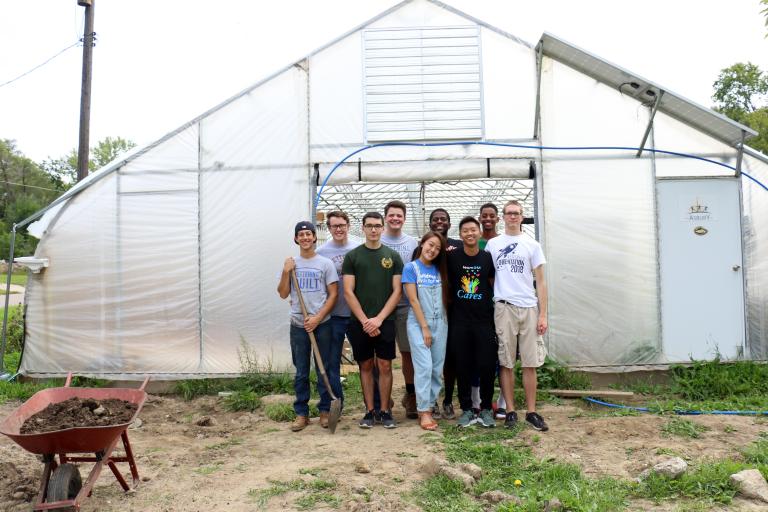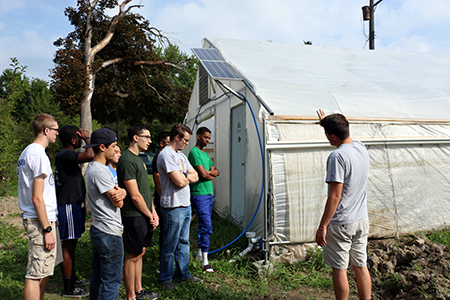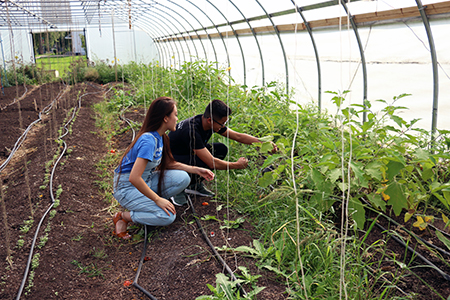
Kettering University students are using their engineering skills and knowledge to bring fresh produce to the Flint community by creating a self-sustaining hoop house.
Students in Kettering’s SAGE (Student Association of Global Engineering) partnered with Asbury Community Center in 2017 thanks to a grant from the Ford Motor Company Fund as a part of the Ford College Community Challenge (C3). That grant has allowed the students to take an existing hoop house and give it more capabilities and opportunities for the community.
The ultimate goal is to provide an environment where Asbury Community Center can grow restaurant-grade produce for the community. 
“This project allows students to get off campus and into the Flint community. There are many opportunities to partner with organizations, but this unique opportunity really allows us to create something from the bottom up as engineering students to apply our education in the real world right here in the community,” said Noah Lukins ‘18, former SAGE president.
Dr. Laura Sullivan, Mechanical Engineering faculty member and faculty advisor for SAGE, is driving community collaboration by connecting Kettering students with local initiatives. Sullivan was key in bringing the grant from the Ford Motor Company Fund to Flint and then connecting students' skillset and knowledge to crucial projects in the city.
Kettering students designed, planned, built, and reworked what they needed in order to make the hoop house sustainable and successful.
They designed and built a solar powered filtration, disinfection, and distribution system. The water filtration system is connected to gutters that collect rain water and drains into a 700-gallon cistern. The students are installing a water pump that will move water from the cistern to the filtration system and water storage tank. Then gravity does its job and draws water into the hoop house as needed.
Collected rainwater passes through mechanical filters and UV disinfection before undergoing ozone treatment within the holding tank to purify the water.
“The Asbury Farm is our response to helping our community have access to fresh produce that is a vital part of long term mitigation of the negative effects of lead. We believe that having the farm within the community will inspire families to pay more attention to what they put on their tables and offer opportunities to learn more about how to care for themselves and their children through better nutrition,” said Rev. Dr. Tommy McDoniel, pastor and executive director at Asbury. “The project with Kettering University will make it possible for Asbury to find economically-effective methods for irrigation with the assurance of safe water for our crops. The students and faculty working in our neighborhood inspires ingenuity and promise for transforming our community into the neighborhood that we aspire to create for our families.”
The ultimate goal, McDoniel said, is a revitalized community where every resident can use their talents and passions for the common good, where children grow into citizens who contribute to building and maintaining a vibrant neighborhood, and all residents are able to enjoy safety, good health, a culture that fosters lifelong learning and satisfying lives.
This project with Kettering faculty and students is a giant step toward this goal, McDoniel said. He hopes to have more projects in the future that utilize sustainable practices including reusable energy. 
“Here at Kettering we have been given skills and the ability to innovate and to bring new ideas to the table, and it is a very fulfilling opportunity to do that in a place that needs it, where you can make a significant impact and make the world a better place,” Lukins said. “That’s what makes serving in the community worth it. It just makes sense for Kettering students to do that. We have the skill, and we have the ability, and you get to walk away with the fulfilling understanding that you made an impact.”
Olivia Bussone ‘22, SAGE vice president, said it was great to see the project unfold over the past year and a half.
“Not a lot of people would immediately think of engineering when they think of a greenhouse, but using engineering to create a greenhouse that is sustainable and efficient was a really amazing thing to see and even more amazing to be able to participate in,” Bussone said. “I feel a lot of pride in seeing the hoop house transformed, and a lot of appreciation for the many people that pulled together to put the work in and make it a reality. Having a sustainable hoop house is really awesome because that means that it will be able to be passed on and taken up by the community that uses it, and its impact will last rather than dying out after a year or two.”
Being a Kettering student means having the opportunity to get involved in the community and get to work with great organizations and people in the neighborhoods, Bussone said. Knowing how much good Asbury already does in the community helped motivate students for this project.
“I think being an involved student at Kettering is a really important part of getting a well-rounded education. The team building, problem solving, and leadership skills that you can gain through involvement in different groups are things that will stick with you and help you throughout the rest of your life, especially in your career,” Bussone said. “In STEM fields, I think it can be kind of easy to get lost in statistics and theories and forget about the human element of things, and getting involved in campus activities is a great way to stay connected to your community and gain a deeper understanding of how the things we learn in school have an impact on the people around us.”